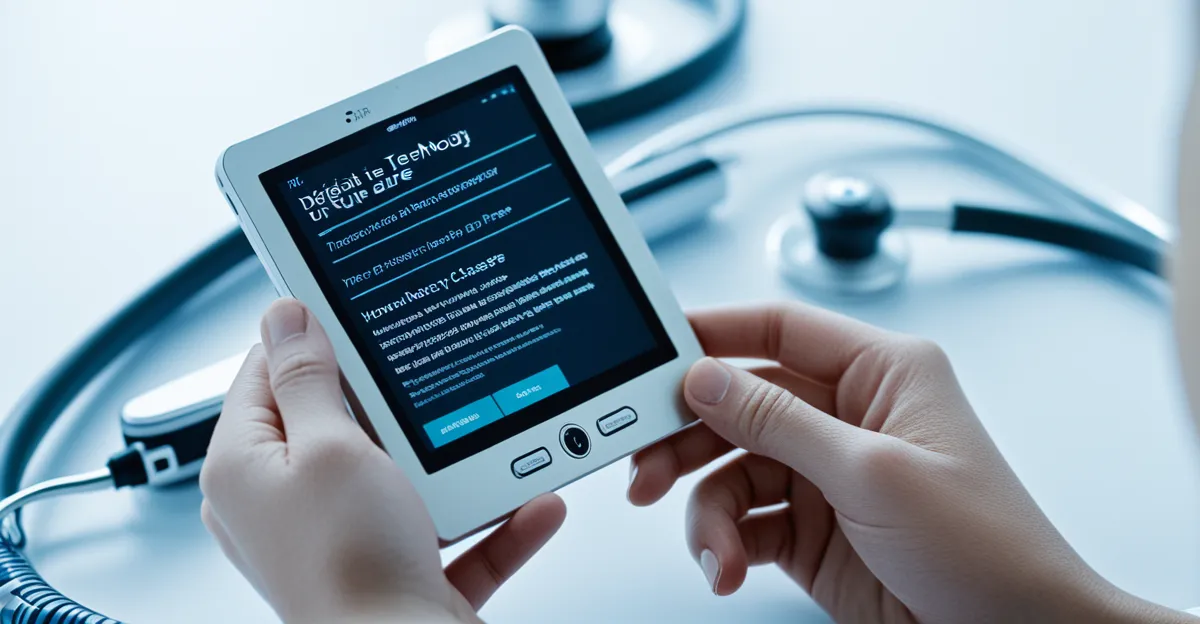Current State of Digital Technology in UK Healthcare
Digital technology is transforming the landscape of UK healthcare with remarkable healthcare innovations. At the forefront of these innovations are tools like Electronic Health Records (EHRs) that ensure seamless data sharing, thereby improving medical coordination and patient safety. EHRs are integral as they maintain current technologies in use, facilitating real-time updates and accessibility across various healthcare settings.
Statistics highlight the increasing adoption rates of digital health solutions. The National Health Service (NHS) reports that around 98% of general practices in the UK have digital health systems in place. This wide adoption underscores the crucial role of digital platforms in enhancing service delivery and patient experience.
Topic to read : Is the NHS Ready for Future Health Challenges?
A particular success story is the use of telemedicine, notably during the COVID-19 pandemic, which shifted many GP consultations to online formats. This not only reduced the strain on healthcare facilities but also expanded access, particularly for remote and vulnerable populations. Another exemplar of digital prowess in healthcare is the use of remote monitoring devices which facilitate continuous patient oversight, allowing for timely interventions and personalized care. These innovative approaches underscore the transformative potential of digital technology in reshaping UK healthcare delivery.
Future Trends in Digital Healthcare Technology
The landscape of healthcare is poised for a technological revolution, with emerging healthcare trends shaping the future of patient care. One significant focus is the integration of AI and machine learning in clinical decision-making, which promises to enhance diagnostic accuracy and treatment precision by analyzing vast datasets for patterns and insights that may elude human observation. These advancements are expected to facilitate more personalized and effective patient care, driving forward the digital health future.
Also read : How can public awareness campaigns enhance health literacy in the UK?
Wearable health technology is another area primed for rapid development. Innovations in personal health devices are enabling individuals to monitor their health metrics in real time. This capability empowers patients with better self-awareness and proactive health management, reducing the need for frequent hospital visits.
Technology advancements in these areas are further complemented by predictive analytics, which can preemptively identify potential health risks and optimize resource allocation in healthcare systems. As we look towards the future, these transformative tools offer a promising avenue for improving healthcare delivery and patient outcomes.
Challenges in Digital Healthcare Implementation
As digital technology continues to revolutionize healthcare, it also presents significant challenges. Technology barriers often disrupt the seamless adoption of these innovations. For instance, older systems in healthcare facilities may lack the capability to integrate new tools, resulting in delays and inefficiencies. Moreover, the cost of upgrading infrastructure can be prohibitive, particularly for smaller institutions with limited budgets.
Data privacy and cybersecurity are primary concerns in the realm of healthcare challenges. Protecting sensitive patient data is critical, yet healthcare providers frequently face vulnerabilities that could lead to breaches and unauthorized access. Ensuring robust cybersecurity measures requires both investment and expertise, which can be challenging to maintain consistently.
Regulatory compliance and standardization are essential for the successful implementation of digital solutions. Standards ensure that new technologies are safe and efficient, but navigating regulatory landscapes can be complex and time-consuming. The necessity for compliance with varying regulations may further complicate the integration process, underscoring the importance of clear guidelines and effective enforcement mechanisms.
Benefits of Digital Technology in Healthcare
The integration of digital technology into healthcare systems offers a myriad of advantages, not least of which are substantial healthcare benefits. One of the primary economic advantages lies in cost reduction. By streamlining operations and reducing the need for paper-based records, healthcare organizations can significantly lower administrative costs. Additionally, telemedicine reduces the need for in-person consultations, cutting down on patient transportation and facility-associated expenses.
In terms of patient engagement, digital tools empower individuals to take charge of their health. Technologies like mobile health apps and portals facilitate better communication between patients and providers. These platforms offer personalized health insights, enabling patients to monitor their conditions and make informed decisions about their care management.
Analytics plays a pivotal role in enhancing healthcare delivery. Through data-driven insights, healthcare organizations can identify trends, predict outcomes, and optimize resource allocation, leading to improved efficiency and patient outcomes. By leveraging data analytics, decision-makers can focus on preventative care, addressing potential issues before they escalate, undoubtedly transforming traditional healthcare models.
Expert Opinions and Case Studies
Exploring the realm of digital technology in healthcare provides illuminating insights into its transformative potential. Insights from healthcare professionals highlight how digital innovations are reshaping patient care and administration. Interviews with experts reveal that electronic health records (EHRs) have enhanced care coordination by centralizing patient data, allowing concurrent access to medical histories, and treatment plans. This facilitates a more integrated approach to managing patient health.
Case studies serve as tangible evidence of the successes achieved through the implementation of digital tools. Consider, for instance, a rural UK healthcare facility that adopted telemedicine solutions during the pandemic. Remote consultations ensured continuous care for patients unable to travel, significantly boosting patient satisfaction and broadening healthcare access. Similarly, the deployment of remote monitoring devices for patients with chronic conditions has led to improved management and reduced hospital readmissions. These examples underscore the enormous potential of digital systems to optimize healthcare delivery, enhance patient experience, and drive better efficiency.
Expert insights further anticipate that the integration of artificial intelligence (AI) will propel healthcare into a new era, offering predictive analytics and refining clinical decision-making processes. As healthcare systems continue to embrace these technological pathways, the importance of clinician input and patient feedback in crafting a responsive and adaptable framework becomes increasingly vital. This collaborative approach promises ongoing improvement in service delivery and patient outcomes, heralding a bright future for digital healthcare advancements.
Conclusion: The Path Forward for Digital Healthcare
The integration of digital technology in healthcare is steering significant transformation. Key findings highlight that healthcare evolution is marked by increased adoption of technologies such as Electronic Health Records (EHRs) and telemedicine, fundamentally reshaping healthcare delivery processes. These advancements have underscored the importance of technology in enhancing both healthcare accessibility and patient outcomes.
For healthcare stakeholders, there is an imperative to embrace emerging technology pathways. This entails fostering environments conducive to innovation and ensuring that both financial and technological resources are allocated to support digital initiatives. Strategic investments in technology advancements will equip healthcare systems to tackle some of the pressing challenges, such as data security and system integration.
Looking ahead, the vision for a digitally transformed UK healthcare landscape is one of collaborative and adaptive evolution. As the sector continues to evolve, the synergy between artificial intelligence, machine learning, and healthcare delivery will likely offer unprecedented opportunities for refining patient care. With continuous innovation and collaboration, the UK stands on the brink of a digital healthcare revolution that promises enhanced efficiency, better patient engagement, and improved overall health outcomes.
Impact of Digital Technology on Patient Care
Digital technology is significantly reshaping patient experience by enhancing healthcare delivery. One major development is the widespread adoption of telemedicine. This approach allows for remote consultations, which are especially valuable for patients in isolated areas or those with mobility challenges. The convenience of attending appointments from home has not only improved accessibility but has also expanded the reach of healthcare providers.
Remote monitoring technology further revolutionizes patient care by enabling continuous health tracking. These devices collect critical health data in real time, allowing healthcare professionals to make timely decisions and interventions. For patients with chronic conditions, such continuous oversight can help prevent emergency situations and reduce hospital readmissions.
A pivotal role is played by Electronic Health Records (EHR) in coordinating care. EHR systems centralize patient information, ensuring that all healthcare providers involved in a patient’s care have access to synchronized data. This comprehensive access helps in avoiding medical errors, streamlining treatments, and offering holistic and integrated care plans.
Case studies exhibit transformative outcomes through digital tools. For instance, a hospital that integrated telemedicine within its service offered uninterrupted access to care during the pandemic, resulting in increased patient satisfaction and better health management. Another facility employed remote monitoring systems for heart failure patients, which led to a significant decline in readmission rates. These tangible results underscore the substantial impact of digital innovations on the quality and efficiency of patient care.




